Posted on 1/31/2024
%20(Small).jpeg)
When we talk about car maintenance, engine oil often takes the spotlight for its crucial role in ensuring a smooth and efficient ride. But let's shift gears and talk about another vital component – the transmission. Just like engine oil, the transmission fluid is pivotal for the health and performance of your car. And this brings us to an interesting question: do transmissions have filters? The short answer is yes, but let's dive into the details to understand their importance. Understanding Transmission Filters Transmission filters play a pivotal role in your car's health. They are designed to keep the transmission fluid clean, which is essential for the smooth operation of your gears. Over time, the transmission fluid can accumulate debris and sludge, which can lead to transmission problems if not filtered out. The transmission filter catches these particles, ensuring that only clean fluid circulates through the system. Types of Transmiss ... read more
Posted on 12/26/2023
.jpeg)
As you slide into the driver's seat on a scorching summer day, a silent hero - the car's air conditioning system - is waiting to make your journey enjoyable. Have you ever wondered about the magic behind the cool breeze that turns your car into a haven of comfort? Join us on a journey through the mechanics of the A/C system, where every component plays a crucial role in orchestrating a symphony of coolness. The Compressor's Role At the heart of the A/C system stands the compressor. This small but mighty component is responsible for initiating the cooling process. It takes low-pressure, gaseous refrigerant and works its magic, compressing it into a high-pressure, high-temperature gas. Condenser Located at the front of your car, it resembles a radiator, and its purpose is to cool down the high-pressure gas from the compressor. As air flows through the con ... read more
Posted on 11/30/2023
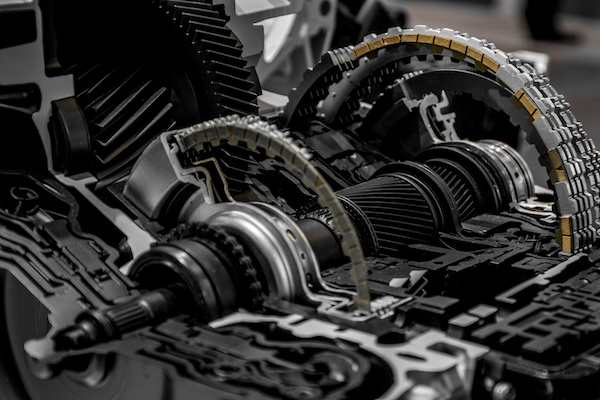
In the balance between man and machine, the automatic transmission shifts the gears that drive our vehicles forward. Yet, for many, the inner workings of this automotive marvel remain shrouded in mystery. Understanding the Basics At the heart of an automatic transmission lies a complex system of gears, torque converters, and hydraulic controls. Unlike manual transmissions, where the driver manually engages, and disengages gears, an automatic transmission takes on this responsibility autonomously, adapting to driving conditions in real-time. Torque Converters The key player is the torque converter. Acting as a fluid coupling between the engine and transmission, the torque converter allows the engine to continue running even when the vehicle is stationary. It efficiently transfers power to the transmission, ensuring a seamless transition between gears without the need for manual intervention. Planetary Gear Sets Central to the automatic transmission's functionality are ... read more
Posted on 10/31/2023

Amidst the symphony of gears and the intricacies of vehicular mechanics, the transmission stands as a vital component, orchestrating the seamless transition of power within the heart of the vehicle. Yet, there come moments when the whispers of wear and tear transform into resounding calls for action. As drivers, we share an unspoken bond with our cars, and recognizing the signs that necessitate transmission replacement becomes a crucial testament to our commitment to safe and reliable journeys. Let's delve into the intricacies of transmission woes, identifying the three definitive signs and situations where embracing a new transmission emerges as the ultimate solution for ensuring continued road worthiness and driving satisfaction. Irreversible Mechanical Failures Amidst the routine hum of the transmission, persistent clunks, grinds, or shudders signal an irreversibl ... read more
Posted on 9/30/2023
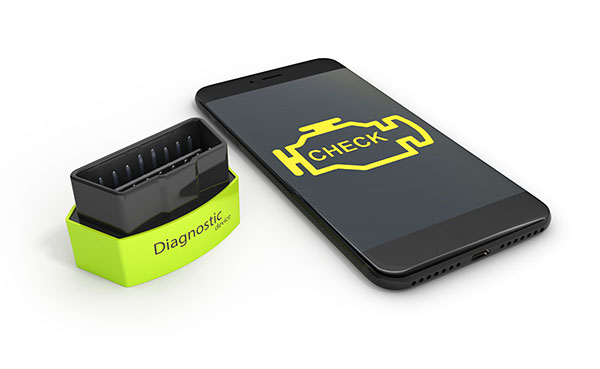
In the realm of modern automobiles, there's a hidden world of magic that keeps your car running smoothly – electrical and computer diagnostics. It's not just science; it's wizardry. Today, we're embarking on a journey to unveil the secrets behind these mystical processes. Understanding the Sorcery of Electrical Diagnostics Imagine your car's electrical system as a network of enchanted pathways carrying vital energy. When something goes amiss, it's akin to a wizard sensing a disturbance in the force. Electrical diagnostics begin with the probing of these pathways using specialized tools. OBD-II Scanner The OBD-II (On-Board Diagnostics) scanner is the modern wizard's wand. It plugs into your car's diagnostic port and communicates with the vehicle's computer (ECU). Through a series of incantations (or rather, code), it extracts information about your car's health. This data includes everything from engine ... read more
Posted on 8/30/2023

With its lush landscapes, breathtaking coastal vistas, and vibrant culture, Oahu is a paradise for road trip enthusiasts. Exploring the island by car unveils a tapestry of natural beauty and cultural gems. Buckle up as we take you on a journey through the most scenic drives in Oahu. 1. Hanauma Bay Drive Begin your adventure along the stunning Hanauma Bay Drive. This coastal road leads to the iconic Hanauma Bay Nature Preserve, offering glimpses of turquoise waters, lush vegetation, and captivating ocean views. Make sure to stop at the Hanauma Bay Lookout for a panoramic vista that's bound to leave you awe-struck. 2. Ka Iwi Scenic Shoreline Continuing from Hanauma Bay, the Ka Iwi Scenic Shoreline takes you on a mesmerizing journey along the rugged eastern coastline. Wind your way through dramatic cliffs, jagged shorelines, and hidden coves. The Makapu'u Lookout offers a breathtaking vantage point to observe the Pacific Ocean's grandeur. 3. Kamehameha Highway - N ... read more
Posted on 7/31/2023
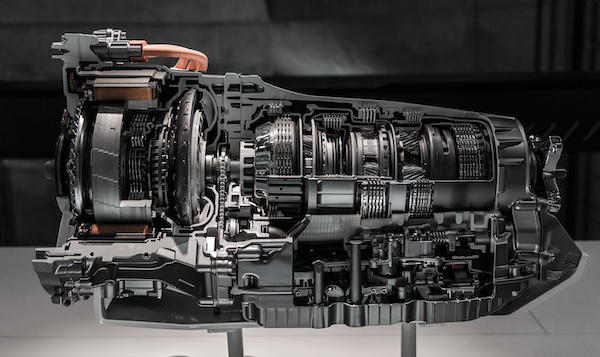
When it comes to the inner workings of your vehicle, one of the most critical components is the transmission. The transmission is in charge of transferring power from the engine to the wheels, allowing your car to shift gears and maintain the desired speed. While we often take the functionality of our transmissions for granted, it's important to understand that there are different types of transmissions, each with its own unique characteristics. Let’s dive into the world of transmissions and explore the various types available in today’s vehicles. Manual Transmission: Let's start with the classic manual transmission. This type of transmission requires the driver to manually engage the gears using a clutch pedal and gear shifter. Manual transmissions offer direct control and can be an engaging driving experience for those who enjoy shifting gears themselves. They are often praised for their simplicity, durability, and potentially better fuel efficie ... read more
Posted on 6/30/2023
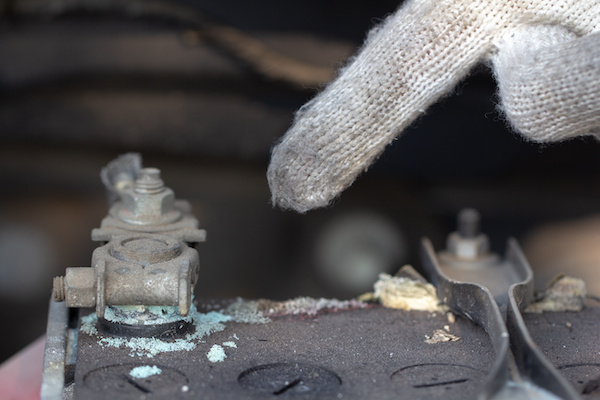
With summer in full swing, it's time to rev up your car maintenance routine and ensure that your vehicle is ready to handle the heat and adventures. While you may focus on oil changes, tire rotations, and air conditioning checks, one vital component often overlooked is the battery. Your car's battery plays a crucial role in powering all its electrical systems, from starting the engine to operating the lights, radio, and air conditioning. To help you avoid unexpected battery troubles during the sweltering summer months, we've put together a handy guide with battery maintenance tips. Keep it clean: Over time, battery terminals can accumulate corrosion, hindering the flow of electricity. You should regularly inspect the battery terminals and clean them using a combination of baking soda and water. The connections should be tightened as well. Check the fluid level: Some car batteries require maintenance and may have removable caps to a ... read more
Posted on 5/31/2023
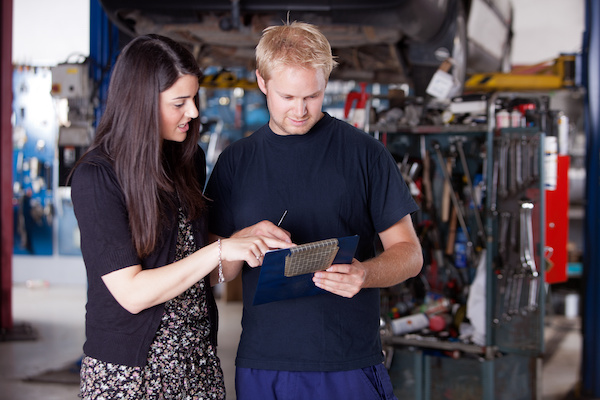
Finding a reliable auto technician can be challenging, especially if you're new to an area or don't have much experience with car repairs. Asking the right questions can help you find a mechanic you can trust. Here are some important questions to ask when searching for a mechanic. What are your certifications and credentials? Before entrusting your car to a mechanic, it's important to ensure they have the necessary certifications and credentials. Look for mechanics who have completed training from a reputable automotive school or have certifications from associations such as the National Institute for Automotive Service Excellence (ASE). Do you specialize in a particular type of car or repair? Some mechanics specialize in particular types of cars or repairs. For example, you may find a mechanic who specializes in European cars or one who specializes in transmissions. If you have a particular type of car or repair that needs attent ... read more
Posted on 4/28/2023
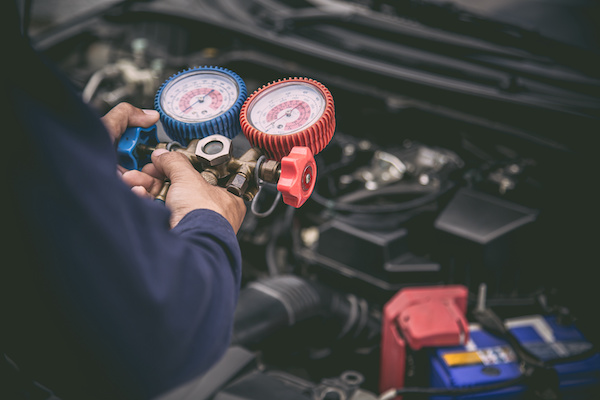
As the weather heats up, you'll want to ensure that your car's air conditioning system is working properly. One common issue that can cause your A/C system to malfunction is a refrigerant leak. If your car's A/C system isn't cooling your car as it should, it's possible that your system is lacking refrigerant. But how do mechanics test for A/C leaks? There are several ways that auto repair shops can test for leaks in an A/C system. Method #1: Visual Inspection One of the simplest ways for a mechanic to determine if there is a refrigerant leak is through a visual inspection. The technician will look for oil stains or residue around the A/C system components, including the compressor, hoses, and connections. Oil stains may indicate that refrigerant has leaked from the system. Method #2: UV Dye Test If a visual inspection doesn't reveal any obvious leaks, another trick we may use is the UV dye test. The technician will add a small amount of UV dye to the A/C s ... read more